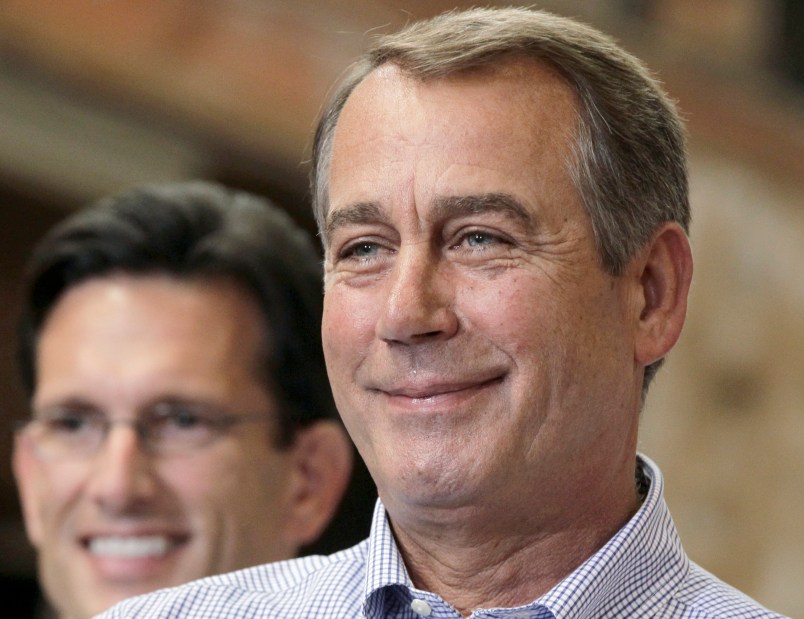Obamacare enrollment is picking up steam, and Republicans have shifted their line of attack against the dreaded law. Their latest beef? The cuts to private insurers under Medicare Advantage will harm seniors.
“We write to express deep concern about the impact of the cuts imposed by your health care law on the Medicare Advantage (MA) program and the recent action by [the Center For Medicare & Medicaid Services] to fundamentally dismantle the Medicare prescription drug program,” wrote six House GOP leaders in a letter to President Barack Obama on Thursday. “These cuts, in addition to proposed rules issued by CMS, will force millions of American seniors to face higher health care costs or lose access to their doctor, health plan, lifesaving drugs, and the benefits they’ve come to rely on.”
It’s a curious line of attack because the GOP’s own budget proposals by House Budget Chair Paul Ryan (R-WI) in 2011, 2012 and 2013 continued those cuts, and Republicans voted overwhelmingly for them. That includes every signatory on the letter: Speaker John Boehner (R-OH), Majority Leader Eric Cantor (R-VA), Majority Whip Kevin McCarthy (R-CA), Republican Conference Chair Cathy McMorris Rodgers (R-WA), Energy & Commerce Chair Fred Upton (R-MI) and Ways & Means Chair Dave Camp (R-MI).
“Congressional Republicans are being totally two-faced about this issue,” House Budget Committee Ranking Member Chris Van Hollen (D-MD) told TPM. “Now they’re attacking the president for something the Republicans included in their own budget, and voted for unanimously in their own budget. This is just a rerun of the last campaign when Mitt Romney attacked the president on this issue, and as soon as the campaign was over Paul Ryan included all these savings in his own budget.”
One top lawmaker who didn’t sign the letter to Obama? Ryan.
The Medicare Advantage reductions represent about one third of the roughly $700 billion in Obamacare’s cuts to Medicare providers, which were used to help finance new spending under the law. The results haven’t all been good. Republicans are right about the fact that the cuts have caused some disruptions, such as canceling existing plans and forcing seniors to switch policies or join traditional Medicare, according to the Kaiser Family Foundation. After Obamacare was enacted, Medicare Advantage premiums actually fell in 2011 and 2012, before going up in 2013 and 2014. Enrollment has risen from 24 percent of total Medicare beneficiaries in 2010 to 28 percent in 2013.

The goal was to stop overpaying private insurers and bring reimbursements more in line with traditional Medicare. “Medicare Advantage plans have been unfairly subsidized for years, causing not only higher expenditures by the federal government, but also higher premiums for traditional Medicare beneficiaries,” said Tim Jost, a health law professor at Washington & Lee University. “Prior to the Affordable Care Act they were being overpaid by 14 percent compared to traditional Medicare.”
The GOP letter serves several political purposes. First, it’s a new way to attack Obamacare as enrollment picks up to 3.3 million, putting the goal of 7 million by the March 31 deadline within reach. Second, attacking Medicare cuts is good politics — Republicans used that cudgel in the 2010 and 2012 elections (despite voting to keep the cuts in 2011 and 2012). Third, insurance companies are screaming about the cuts and want to reverse them. This attack appeases insurers after Republicans angered them by toying with repeal of Obamacare’s risk corridors, a mechanism that protects insurers from severe market instability.
“Do the Republicans really propose to continue to overpay Medicare Advantage plans and drive up the deficit? I doubt it,” said Jost. “But Medicare is always a great election year issue.”
For now, at least, GOP leaders are saying they do want to repeal the cuts: “If you will not work with us to repeal the law and enact better solutions,” they wrote to Obama, “we urge you to instruct Secretary Sebelius to develop a plan to address the devastating impact of these cuts, ensuring – at a minimum – that seniors will not experience further disruptions in 2015.”






